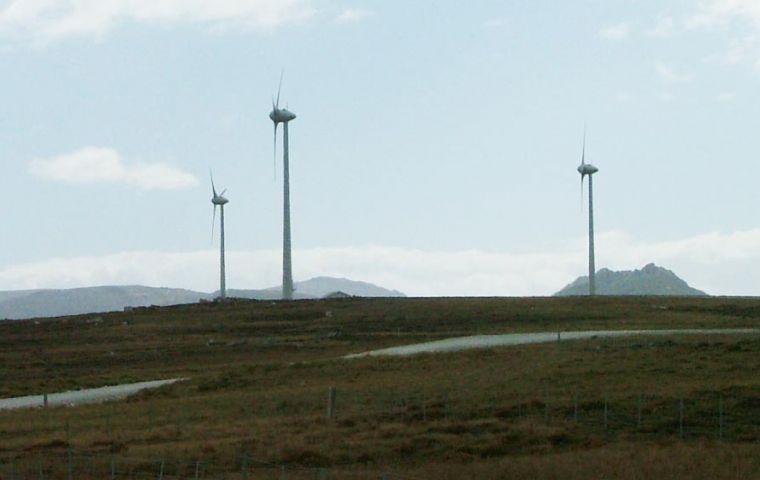MercoPress. South Atlantic News Agency
Falklands’ wind power contribution new record: 40% of Stanley’s consumption
 The Islands have six wind turbines; the last three became operational in February
The Islands have six wind turbines; the last three became operational in February Annual wind power contribution in the Falkland Islands has set a new record with the significant milestone of 40% of renewable contribution, according to Stanley Power Station Manager Glenn Ross.
This month the Sand Bay Wind Farm produced 40% of the total electricity required by Stanley. This beats the previous high of 38% achieved in August.
The Sand Bay Wind Farm produced 115,272 units of electricity at an hourly average for the week of 686 kilowatts. The highest hourly output was 1200 kilowatts and the highest hourly percentage was 57%.
Glenn Ross said that fuel Displacement was 30,290 litres which gave an estimated weekly saving of £14,720.
The Falklands currently have a total of six wind turbines the last three became operational on line last February.
The installation of the first three wind turbines in 2007 resulted in the displacement of 26% of annual fuel consumption, reported at the time the Falklands government.
“This figure (40%) compares favourably to the UK Government's goal for 20 per cent of electricity produced in the UK to be renewable by 2020, proving the Islanders’ commitment to renewable energy. As well as reducing their carbon footprint in order to protect the pristine environment of the Islands, the increase in renewable energy has meant that the cost of electricity has been reduced by six pence per unit for Islanders”, said the Falklands’ government release.
The latest turbines to be incorporated are the same type and make as the first three turbines: 330 kilo-watt synchronous variable speed and variable pitch turbines manufactured by Enercon (Germany).
The next phase in the development of the wind farm will be energy storage, achieved by charging a 2MWh battery during optimal wind times and discharging the battery when wind is not available. This will ensure that energy production is kept more constant.



Top Comments
Disclaimer & comment rules-

-

-

Read all commentsI am not surprised considering how much hot air is blown in from the West.
Nov 15th, 2010 - 07:21 pm 0I'll give you the benefit of the doubt and assume that you don't mean West Falkland!
Nov 15th, 2010 - 08:07 pm 0Pff, so advanced! We have this in la Patagonia and in other places in our country.
Nov 15th, 2010 - 09:46 pm 0http://www.telpin.com.ar/interneteducativa/PeriodicoTEduca/EnergiaEolica/patagonia.htm
http://www.telpin.com.ar/interneteducativa/PeriodicoTEduca/EnergiaEolica/patagonia.htm
Commenting for this story is now closed.
If you have a Facebook account, become a fan and comment on our Facebook Page!